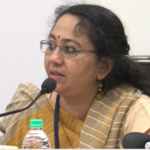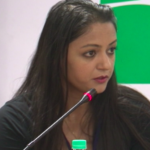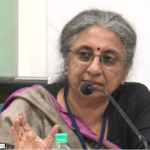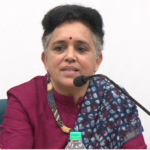Session 1. Online GBV: State of Play
Speakers
J.Devika, Centre for Development Studies, Trivandrum
Shehla Rashid, Student, Jawaharlal Nehru University, New Delhi
Justice Prabha Sridevan (retd.), Madras High Court, Chennai
Chair
Lakshmi Lingam, School of Media and Cultural Studies, TISS, Mumbai
Women claiming the digital as ‘own space’: Reflections on the Malayalam public sphere

J.Devika, Centre for Development Studies, Trivandrum
Framing gender-based cyber violence through concepts of third-wave feminism in the Indian context would allow us to move away from singular monolithic experiences and account for all bodies oppressed by gender. It is also important to understand the debate in relation to regional contexts. Kerala, has high tele-density, Internet penetration and a large percentage of women with higher education who also use the Internet.
From the 1990s, in the Malayalam public sphere, we see increasing female individuation with improved access to technology. The cyber-world has helped female actors from the local film industry fight against rampant sexism within the industry. Mobile phones are now regarded as ‘own space’ or private space by women, through which they use the Internet for self-construction. This autobiographical use of the Internet has opened up the ‘private’ that lies beyond the domestic. But there has also been a push back by misogynistic forces because of the automatic association of the ‘private’ with the ‘sexual’. Mere visibility in online spaces is sufficient to invite condemnation for being a ‘femi-nichi’ (Malayalee slur that means femi-nazi).
The visbilization of gender has made anyone and everyone a ‘feminist’, and hence open to attack. However, the individualizing nature of the online space makes it difficult to fight back collectively. Part of the problem is that the structure of the Internet makes empathetic communities and the compromises that come with it unfashionable.

Gender-based hate speech online and the inadequacy of existing responses
Shehla Rashid, Student, Jawaharlal Nehru University, New Delhi
Gender-based cyber violence is so rampant that it is normalized. For women activists who are online in India, gender based abuse – death and rape threats, and other identity-based abuse, are frequent and incessant, and are designed to prevent them from effectively functioning their public role. Lot of the misogyny spotted online does fall under the rubric of hate speech. Platforms such as Twitter are used for strategic political purposes by the government, and are often overrun by anti-minority hate speech from private and public actors alike. However, platforms have not taken adequate action against the abusers, instead allowing them to continue to perpetuate hate speech with impunity. Further, verbal and image based gender abuse online is often not perceived as violence by institutional actors.
Hate speech is not a matter of speech alone. In some cases it must be counted as action that is violent. The Brandenburg test from the US states that a speech act is not protected if the speaker intends to incite a violation of the law that is both imminent and likely. The test does not, however, acknowledge the psychological aspect of violent speech. Jeremy Warren sought to capture this through the concept of ‘group defamation’ which impairs the ability of the community to participate fully in public life. Gender based hate speech curtails participation of women in public life as full citizens. Another limitation of the Brandenburg test is that words have to lead to violence. The words themselves are not considered violent. Sometimes, speech can be violence in itself. For example, asking for sexual favors at the workplace is sexual harassment, even if it is not followed up by action.
Speech acts are treated very differently from physical acts where in there is no separation of action and consequence. However, J.L Austin recognizes that there may be speech acts where the very utterance performs the action that it describes; for example, a judge sentencing a man to death. He terms such speech acts ‘illocutionary acts’. In the Indian context, the Scheduled Castes and Tribes (Prevention of Atrocities) Act is one of the few legislations that recognizes hate speech as violative action. The Act construes caste as the basis of structural subordination of entire groups, with extreme power imbalances between groups.
Hate speech provisions in the Indian Penal Code (IPC), however, take a horizontal approach to communities and assume a flat social structure where there are no power differences between majority and minority communities. Restrictions on hate speech should not be seen as a derogation of free expression but as enabling provisions. We thus need a better defined hate speech provision that responds to gender and sexual discrimination. The law must also, however, set adequate thresholds to prevent its frivolous use.
Gender-based cyber violence as real violence

Justice Prabha Sridevan (retd.), Madras High Court, Chennai
The law and its officers are stuck in the ‘physical’, and the instinct in cases of violence is to focus on identifying physical injury. However, the logic of cyberspace is different from the real world, and hence, laws of the cyber world must be different from the real world. The cyber world can be oppressive and exclusionary. The digital is intimidating, but it is so entrenched in our lives that we cannot abandon it. Essentializing violence as a problem of urban, educated women is a convenient reductionism by officials to evade responsibility for providing effective redress to gender-based cyber violence.
Most laws focus on punishment or protection but not prevention. However, it is ‘prevention’ that is the crux of state recognition of rights. When a woman makes a complaint of violence, it is a violation of her right that is being reported. And so the law must use language that forces officers of the law to acknowledge the inviolability of the right to dignity. Harm must be understood as an affront to dignity.

Open discussion
Before throwing open the floor for discussion, Lakshmi Lingam, chairing the session, made a few concluding observations.
The continuous interspersing of what happens online with what is happening offline and the difficulty in keeping these worlds apart needs to be interrogated, especially when they are posed together to the detriment of women. Image-based evidence of an amicable offline relationship may be used to counter women’s claims of abuse.
Comments from the floor
1. The Cartesian mindset we have inherited from our colonizers has programmed us to make false dichotomies between physical and emotional harm. Within traditional knowledge systems, there are theorizations that break away from this, and perhaps laws on speech harms can borrow from such homegrown concepts.
2. We need more research on regional and linguistic specificities of gender-based cyber violence within India.
3. The divide between feminist activists who predominantly engage with online spaces and those who are predominantly offline must be bridged. Building empathetic communities where solidarities can be formed is an important task. Such networking is essential if feminists want to be effective. The naive belief that activism on the Internet alone will lead to effective justice needs to be re-evaluated. The #metoo movement and its fallout in India in the form of ‘the list’ of academics accused of sexual harassment has its strengths and weaknesses, and we must acknowledge both. It did trigger introspection within the feminist community on entitlement. The democratization and feminisation of the Internet means every issue is challenged, debated and resolved.
4. Gender-based cyber violence needs more than legal responses. A host of efforts are required from Internet intermediaries, educational institutes and workplaces. Sustained political conversation on the issue is necessary.